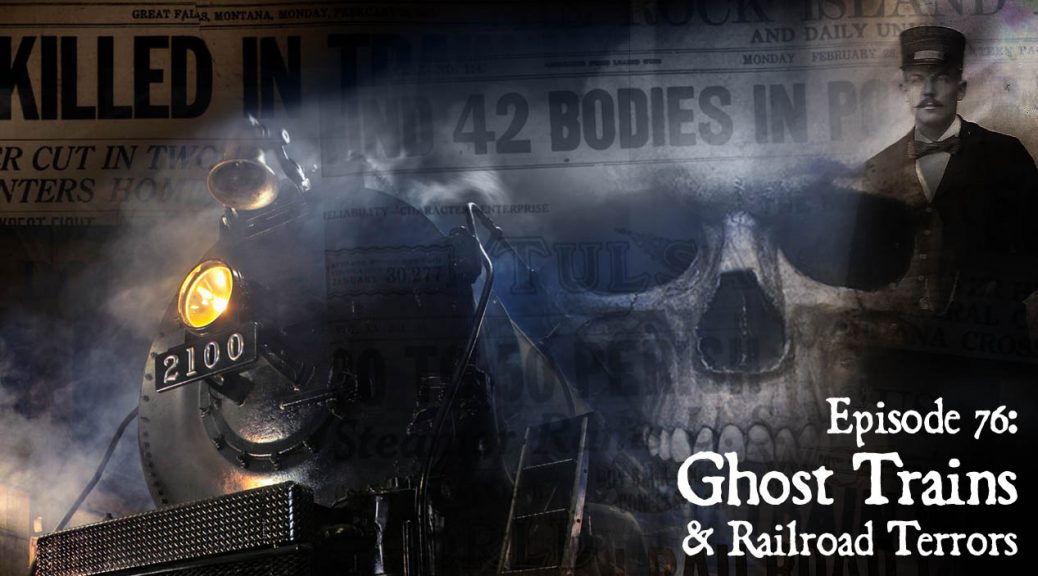
Ghost Trains & Railway Terrors
Podcast: Play in new window | Download (Duration: 52:34 — 60.2MB)
Subscribe: Apple Podcasts | Spotify | Android | Podchaser | RSS | More
Ghost trains and real-life railway terrors intermingle in this episode’s exploration of old train-wreck ballads, nervous and funereally obsessed Victorians, urban legends involving train deaths, and more.
Mrs. Karswell begins our show reading an imaginitive description of a phantom train written by George A. Sala for an 1855 edition of the magazine, Household Words, published by Charles Dickens (whose railroad connections we’ll be discussing).
Next we hear a bit of Vernon Dahhart’s 1927 ballad, “The Wreck of the Royal Palm,” describing an accident that had happened near Rockmart, Georgia the previous year. Other folk songs including gruesome railroad deaths are then explored. These include “In the Pines,” “The Wreck of the Old ‘97,” and “Wreck on the C&O,” including snippets from versions recorded by Lead Belly, Vernon Dalhart, and Ernest Stoneman respectively (with a reiteration of a line from “C&O,” by The Kossoy Sisters.) ** FOR MUSIC DETAILS SEE BELOW.
We next hear a bit about an obsession with dangerous trains expressing itself on London’s stages in theater productions of the mid-to-late 1800s. One manifestation was the “sensation dramas” of the day, which presented trains and train wrecks on stage via highly developed stagecraft. Another trend involving characters imperiled on railroad tracks was launched by the 1867 play, Under the Gaslight. The 1923 play Ghost Train is also discussed.
 Our attention turns back to Charles Dickens as we hear a vivid passage describing the death of the nemesis of his novel Dombey and Son, published as a serial between 1846 and 1848; it is literature’s first death by train. Mention is also made of his classic ghost story, “The Signalman” from 1865.
Our attention turns back to Charles Dickens as we hear a vivid passage describing the death of the nemesis of his novel Dombey and Son, published as a serial between 1846 and 1848; it is literature’s first death by train. Mention is also made of his classic ghost story, “The Signalman” from 1865.
Dickens’ ambivalent, and somewhat fearful, attitude toward the railroads seems to be rooted in the railways’ effect on the traditional patterns of life in Britain’s towns and villages, but also has roots in personal experience, namely as a passenger in the 1865 Staplehurst Disaster. A train wreck that not only affected his literary themes, but his personal wellbeing for years to come.

We then switch gears to examine a few localized legends from American involving trains. The first is the Maco Ghost Light encountered near the tiny North Carolina town of Maco Station and said to represent the lantern of an undead (and decapitated) railway worker. We also look at a legend from Texas, that of the San Antonia Ghost Tracks, in which aa alleged accident involving a school bus and train spawned reports of supernatural occurrences.
Another North Carolina legend examined involves an 1891 train accident on Bostian Bridge near the town of Statesville. The ghost stories associated with the site recount appearances of the the doomed train on the anniversary of its accident. The first of these is said to have happened on the 50th anniversary in 1941, but an even more terrifying encounter from 2010, on the 119th anniversary, is also discussed.
Beginning in 1872, seven years after Abraham Lincoln’s death in 1865, supernatural tales stories began to be told of the train that carried the dead president’s body through 12 cities in which he lay in state. We hear just one of the stories published in The Albany Evening Times.
 We then examine the musical phenomenon of songs that portray phantom trains as conveyances to the afterlife, in particular the gospel trope of Death as a Train that may arrive to unexpectedly whisk you off to the Great Beyond, thereby reminding listeners of the need to get right with God. An elaboration of this theme involves the Hell Train, driven by the Devil himself, one which takes those who refuse to make the afore-mentioned spiritual preparations. Included here are songs or song-sermons recorded by The Clinch Mountain Clan, The Carter Family, Rev. J. M. Gates, Rev. H.R. Tomlin, Rev. A.W. Nix, Chuck Berry, and Gin Gillette.
We then examine the musical phenomenon of songs that portray phantom trains as conveyances to the afterlife, in particular the gospel trope of Death as a Train that may arrive to unexpectedly whisk you off to the Great Beyond, thereby reminding listeners of the need to get right with God. An elaboration of this theme involves the Hell Train, driven by the Devil himself, one which takes those who refuse to make the afore-mentioned spiritual preparations. Included here are songs or song-sermons recorded by The Clinch Mountain Clan, The Carter Family, Rev. J. M. Gates, Rev. H.R. Tomlin, Rev. A.W. Nix, Chuck Berry, and Gin Gillette.
The episode ends with a look at the not terribly successful embalming of Abraham Lincoln prior to his his funeral tour, punctuated by a snippet from “In the Pines” AKA “The Longest Train” by Dead Men’s Hollow.
** NOTE: a streaming library of the numerous songs featured in this episode, along with some additional songs of similar themes, is available to those who join our Patreon as supporters before December 1.